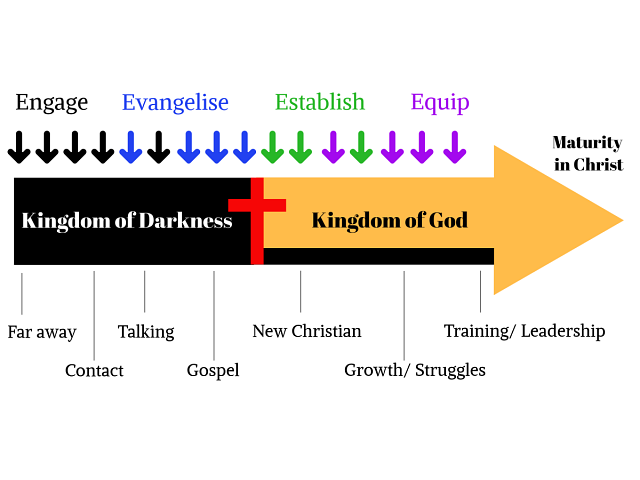Sunday 10th March 2019
Over the past few weeks we’ve been thinking about how to make disciples. It’s such an important thing for us to understand because it was the last instruction Jesus gave to his disciples and it is by making disciples that the church grows. We have understood a disciple as someone who learns Jesus – learning about Jesus is part of that but it is possible to know about someone and not like them, and not want to be like them. Learning Jesus involves knowing about Jesus by reading and studying the Bible, believing that what the bible says about him is true and then trying to live out his teaching. We are expected to become more like Jesus in our attitudes and actions. Of course, we are also expected to share what we have experienced with other people so that they might come to believe as well.
If you are here regularly you’ll recognise this picture:

We’re at the cross-over between Engage and Evangelise today. Today is clearly an incident where Paul builds on the experience and history of the people he is talking to. Like Epimenedes, Paul finds a city full of idols and he is ‘greatly distressed’. What does he do?
He goes to the people of God and ‘reasons’ with them! Start with the people of God because they should know better – they have experienced God at work in their lives already. My experience, having been involved in a number of churches, and in speaking to colleagues – and my own reaction to things – is that it is often difficult to ‘reason’ with church members! At least to do it in a way that leads to changed behaviour.
Actually, that’s another reason that making disciples is so important – disciples are expected to change. Later in this service, we are going to share the Communion meal and part of Paul’s instruction about that is that we should examine ourselves before we eat it. We will never find ourselves worthy. We are not perfect. But we should find that we are not the same as last year, or ten or twenty years ago. We are just that little bit closer to God – that little bit more like Jesus.
It may be that there is someone here today and you don’t feel like that – but feelings are difficult things and not really to be relied on. That’s why I said we’ll never find ourselves worthy. We know the obvious and hidden sins in our lives. No, I am not worthy, but I believe in the One who is. This is a meal to strengthen and encourage the people of God to get on with the work of God. It is a reminder of what we have received, and prompt that we are expected to share with others.
Acts 17:17 So he reasoned in the synagogue with both Jews and God-fearing Greeks, as well as in the marketplace day by day with those who happened to be there.
Paul also went into the market-place and spoke to whoever was there. He would strike up a conversation and use it to talk about Jesus. He was not the only one doing that because he got into conversation with some philosophers and they invited him to the Areopagus – the debating chamber.
What does he do? First, he acknowledges their beliefs – they have all these gods to worship: polytheism.
Secondly, he tells the story in a way they can understand. Paul uses the word theos, for God. It was commonly used for any deity and was not usually a personal name, however, these philosophers would have known that some of the greatest philosophers ever, Xenophanes, Plato and Aristotle used the word theos as a personal name for one supreme God in their writings. These philosophers believed there could be one God who was far above all others.
So, when Paul starts talking he is confirming to them that such a God exists and that it is possible to know him.
Thirdly, Paul quotes from their own literature.
|
Aratus in his work entitled Phaenomena 1-5 stated: “Let us begin with Zeus, whom we mortals never leave unspoken. For every street, every market-place is filled with Zeus. Even the sea and the harbours are full of his deity. Everywhere, everyone is indebted to Zeus. For we are indeed his offspring. |
|
Paul was trying to convey to them that the unknown God was not Zeus but the true God, who had made himself known in Jesus. The true God who created all things and every person. |
He also quoted from Epimenedes who stated in
|
his work entitled Cretica: |
|
“They fashioned a tomb for thee. O holy and high one.. . . But thou art not dead, thou livest and abidest forever. For in thee we live and move and have our being.” |
|
Paul uses the poet’s words to introduce the Greeks to the death and resurrection of the true God, Jesus Christ. |
More than that though, Paul is going to be able to show them that this God is not a ‘foreign’ God, he has actually saved them in the past.
Fourth, Paul made disciples.
Acts 17:3434 Some of the people became followers of Paul and believed. Among them was Dionysius, a member of the Areopagus, also a woman named Damaris, and a number of others.
They became followers of Paul – and believed. They learned Jesus from Paul. They met Jesus in the teaching of Paul and they experienced Jesus while sharing with Paul. They have moved into the Evangelise, Establish and Equip areas.
I suspect, although it really is a guess, that there would be some people who very quickly believed in Jesus and began to grow in faith. Others would have been really interested but would have taken more time to understand and believe so Paul and his team – at least Silas, Timothy and Luke were there with him – used the time they had there to build up and establish these new Christians. Again, I suspect that Paul would be out in the streets while some of the others would be more involved in the teaching and training of the new converts.
I do wonder what(Disciple: be one. Make one) Dionysius and Damaris did to merit a mention by Luke – we don’t know because this is their one and only mention in the bible. Paul has a habit of mentioning people who have been a real help to him in his ministry though and it is likely that’s why they are there.
So, what do we learn from this? We need to acknowledge that people in our day have their own beliefs and that it is ok to (politely) challenge those beliefs, and have our beliefs challenged in return.
Second, we need to find appropriate ways to tell the story in our day.
Third, we need to be able to use cultural references and understand that different generations understand things very differently.
Fourth, some of us are going to have to give time, lots of time, to help other people in their walk with God. We need to learn how to be disciples together.




